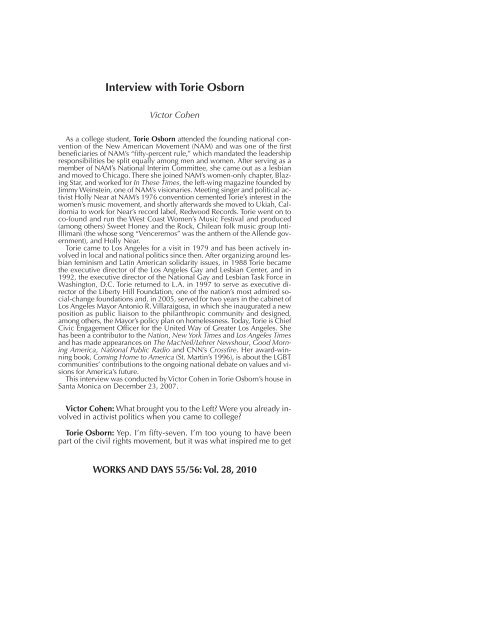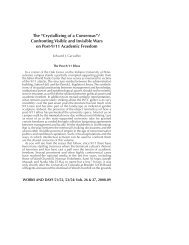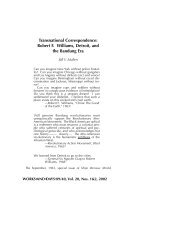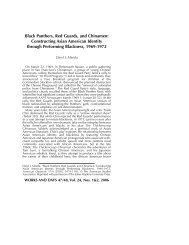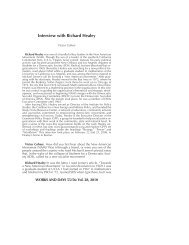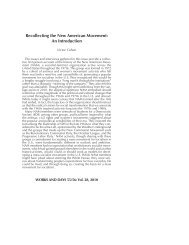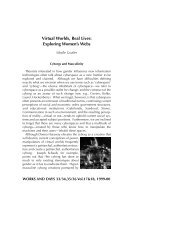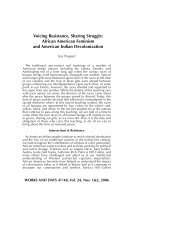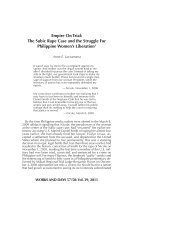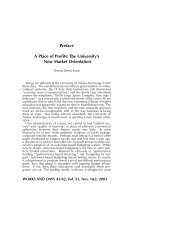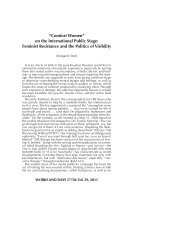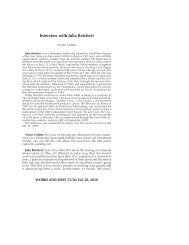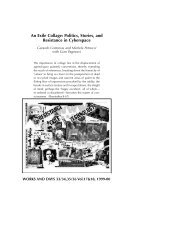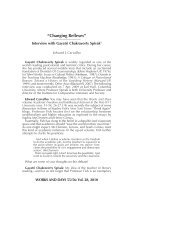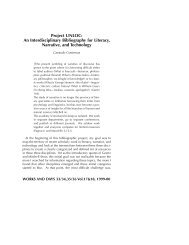Victor Cohen Interview with Torie Osborn - Works and Days
Victor Cohen Interview with Torie Osborn - Works and Days
Victor Cohen Interview with Torie Osborn - Works and Days
Create successful ePaper yourself
Turn your PDF publications into a flip-book with our unique Google optimized e-Paper software.
<strong>Interview</strong> <strong>with</strong> <strong>Torie</strong> <strong>Osborn</strong><br />
<strong>Victor</strong> <strong>Cohen</strong><br />
As a college student, <strong>Torie</strong> <strong>Osborn</strong> attended the founding national convention<br />
of the New American Movement (NAM) <strong>and</strong> was one of the first<br />
beneficiaries of NAM’s “fifty-percent rule,” which m<strong>and</strong>ated the leadership<br />
responsibilities be split equally among men <strong>and</strong> women. After serving as a<br />
member of NAM’s National Interim Committee, she came out as a lesbian<br />
<strong>and</strong> moved to Chicago. There she joined NAM’s women-only chapter, Blazing<br />
Star, <strong>and</strong> worked for In These Times, the left-wing magazine founded by<br />
Jimmy Weinstein, one of NAM’s visionaries. Meeting singer <strong>and</strong> political activist<br />
Holly Near at NAM’s 1976 convention cemented <strong>Torie</strong>’s interest in the<br />
women’s music movement, <strong>and</strong> shortly afterwards she moved to Ukiah, California<br />
to work for Near’s record label, Redwood Records. <strong>Torie</strong> went on to<br />
co-found <strong>and</strong> run the West Coast Women’s Music Festival <strong>and</strong> produced<br />
(among others) Sweet Honey <strong>and</strong> the Rock, Chilean folk music group Inti-<br />
Illimani (the whose song “Venceremos” was the anthem of the Allende government),<br />
<strong>and</strong> Holly Near.<br />
<strong>Torie</strong> came to Los Angeles for a visit in 1979 <strong>and</strong> has been actively involved<br />
in local <strong>and</strong> national politics since then. After organizing around lesbian<br />
feminism <strong>and</strong> Latin American solidarity issues, in 1988 <strong>Torie</strong> became<br />
the executive director of the Los Angeles Gay <strong>and</strong> Lesbian Center, <strong>and</strong> in<br />
1992, the executive director of the National Gay <strong>and</strong> Lesbian Task Force in<br />
Washington, D.C. <strong>Torie</strong> returned to L.A. in 1997 to serve as executive director<br />
of the Liberty Hill Foundation, one of the nation’s most admired social-change<br />
foundations <strong>and</strong>, in 2005, served for two years in the cabinet of<br />
Los Angeles Mayor Antonio R. Villaraigosa, in which she inaugurated a new<br />
position as public liaison to the philanthropic community <strong>and</strong> designed,<br />
among others, the Mayor’s policy plan on homelessness. Today, <strong>Torie</strong> is Chief<br />
Civic Engagement Officer for the United Way of Greater Los Angeles. She<br />
has been a contributor to the Nation, New York Times <strong>and</strong> Los Angeles Times<br />
<strong>and</strong> has made appearances on The MacNeil/Lehrer Newshour, Good Morning<br />
America, National Public Radio <strong>and</strong> CNN’s Crossfire. Her award-winning<br />
book, Coming Home to America (St. Martin’s 1996), is about the LGBT<br />
communities’ contributions to the ongoing national debate on values <strong>and</strong> visions<br />
for America’s future.<br />
This interview was conducted by <strong>Victor</strong> <strong>Cohen</strong> in <strong>Torie</strong> <strong>Osborn</strong>’s house in<br />
Santa Monica on December 23, 2007.<br />
<strong>Victor</strong> <strong>Cohen</strong>: What brought you to the Left? Were you already involved<br />
in activist politics when you came to college?<br />
<strong>Torie</strong> <strong>Osborn</strong>: Yep. I’m fifty-seven. I’m too young to have been<br />
part of the civil rights movement, but it was what inspired me to get<br />
WORKS AND DAYS 55/56: Vol. 28, 2010
68 WORKS AND DAYS<br />
involved in the antiwar movement in high school, from ’65 on. I<br />
graduated in ’68, the Columbia uprising had just happened, <strong>and</strong> it<br />
was the center of the student movement. So I applied <strong>and</strong> went to<br />
Barnard in the fall. This was before women went to Columbia. Well,<br />
of course, by the time I got to Barnard, SDS had fallen apart. It had<br />
become Weathermen <strong>and</strong> Progressive Labor, <strong>and</strong> there really wasn’t<br />
an organizational place for somebody like me who was an independent<br />
radical. When I was a freshman, I remember somebody<br />
used the words the “New Left,” so I said, “Okay, that must be me.”<br />
<strong>Cohen</strong>: Were your parents on the Left? How did you come to<br />
this so quickly? Right out of high school you were ready to join the<br />
movement?<br />
<strong>Osborn</strong>: My parents were good liberals, Cold War anticommunist<br />
liberals: voted-for-Kennedy-Roosevelt-Adlai-Stevenson-<br />
Democrats. They were Catholic; they liked the Berrigan brothers,<br />
<strong>and</strong> I saw my politics as the logical extension of their politics. They<br />
valued civil rights, social reform. It was pretty inevitable that I would<br />
be attracted to the New Left. But it created a schism in my family. All<br />
through high school I argued <strong>with</strong> them about the Vietnam War. It<br />
took until the Pentagon papers in 1971 for my parents to turn against<br />
the war <strong>and</strong> for me to be vindicated. But that happened in liberal<br />
households all over—the kids became radicals of various stripes.<br />
Today, there’s practically no difference in our politics. [chuckles] I<br />
mean, I’m older <strong>and</strong> have a mortgage <strong>and</strong> George Bush has radicalized<br />
them.<br />
But there was also a mass movement all around me, <strong>and</strong> it was<br />
inviting <strong>and</strong> intoxicating. At Columbia, they did a survey <strong>and</strong>, if I’m<br />
remembering correctly, something like fifteen percent of the students<br />
considered themselves conservatives, but eighty-five percent of us<br />
were some form of radical. We rebelled against the word “liberal.”<br />
Of course, Columbia was the heart of the student movement, <strong>and</strong><br />
the peer culture tended to be leftist, whether counter-cultural or<br />
overtly political, <strong>and</strong> everything in between. I was never a supercounter-cultural<br />
person, but we all lived in households, in communes,<br />
in collectives. Everybody did. The counter-culture was a mass<br />
phenomenon. And then there was the music <strong>and</strong> the folk clubs. I<br />
waitressed at a folk club in high school.<br />
When I came to college, I hadn’t read any theory; I didn’t know<br />
anything about anything, but I identified as a radical. I remember all<br />
these guys—<strong>and</strong> they were all white men—would st<strong>and</strong> up in front<br />
of Low Library at demonstrations yelling about the “racist, imperialist,<br />
genocidal” war. And I’m thinking, “Hello, I want to be organized.<br />
Could you please explain what these big words mean?” It was<br />
really obnoxious. I attended one of the first women’s liberation meetings<br />
at Barnard in 1969 <strong>and</strong> eventually found a group called Students<br />
for a Restructured University that I could connect <strong>with</strong>, a left<br />
liberal group. There was just a lot of activism. This was in ’70, after<br />
we shut down the university following the invasion of Cambodia.<br />
Then I transferred—for a bunch of personal reasons—to a small<br />
school in Vermont called Middlebury College, which was very un-
<strong>Osborn</strong> 69<br />
political but turned out to be very good for me. Instead of feeling<br />
lost at Columbia, I was one of only two organizers on campus, the<br />
other being Steve Early (a longtime labor organizer <strong>and</strong> writer), <strong>and</strong><br />
he became my mentor. Middlebury was a great place to learn how<br />
to organize because there were only us two. I could be a big fish in<br />
a small pond. We got nearly forty people to May Day in 1971 in<br />
D.C., where over 11,000 students did civil disobedience. Steve <strong>and</strong><br />
I organized the Radical Education Action Project <strong>and</strong> brought in all<br />
these speakers. I was an editor <strong>and</strong> had a column called “Notes from<br />
Women’s Lib” in the campus newspaper. We lived in communes <strong>and</strong><br />
collectives during the summer, doing antiwar organizing, supporting<br />
efforts such as Medical Aid to Indochina—you know. [SDS organizer]<br />
Lee Webb came <strong>and</strong> taught us about Marxism; we climbed<br />
a mountain, sat down under a tree, <strong>and</strong> learned the “labor theory of<br />
value” <strong>and</strong> other basic Marxist tenets. I met Peg Strobel in my senior<br />
year, ’71-’72, <strong>and</strong> she <strong>and</strong> I founded the Middlebury College<br />
Women’s Union, the first feminist group there, <strong>and</strong> became friends.<br />
She was also my African history teacher <strong>and</strong> one reader on my thesis.<br />
That’s when you heard about the New American Move-<br />
<strong>Cohen</strong>:<br />
ment?<br />
<strong>Osborn</strong>: Yes. In my senior year, in ’72; I can’t remember how or<br />
why Steve <strong>and</strong> I went to the founding national convention in Minneapolis.<br />
I was impressed <strong>with</strong> Michael Lerner’s pamphlet, “Learning<br />
from the Mistakes of the Past,” <strong>and</strong> I ended up getting elected to<br />
the National Interim Committee because of NAM’s rule about having<br />
50 percent women. I did not have the leadership skills. I was really<br />
like a baby—an apprentice organizer. But that experience made<br />
me a believer in affirmative action. So I was elected to this thirteenmember<br />
committee <strong>with</strong> Jim Weinstein, Peggy Somers, Harry Boyte,<br />
Roberta Lynch, Frank Ackerman, Judy MacLean . . . I can’t remember<br />
them all. But Frank <strong>and</strong> I would drive to these meetings every<br />
six weeks, in Pittsburgh, Clevel<strong>and</strong>, or Chicago. They rotated. I<br />
would drive from Vermont <strong>and</strong> pick him up in Boston, <strong>and</strong> the two<br />
of us would drive to the Midwest. The really weird thing was that out<br />
of thirteen of us, three of us (Frank, Peggy <strong>and</strong> myself) had been to<br />
the same Quaker elementary school outside of Philadelphia, Haverford<br />
Friends School. I mean, it shows you the class <strong>and</strong> cultural limitation<br />
of our corner of the New Left. But it also shows you the power<br />
of the Quakers to influence people’s worldviews.<br />
<strong>Cohen</strong>:<br />
What about NAM drew you in so strongly?<br />
<strong>Osborn</strong>: Whether it was because I was born in Denmark, or because<br />
I was a recovering Catholic, I had a strong antipathy for ideology,<br />
for any kind of fundamentalism. I always felt, if you think<br />
yours is the only one right <strong>and</strong> true way, I’m out of there. And NAM<br />
was very open. There were different stripes of people, from kind of<br />
social democrats to former communists. It was a much more comfortable<br />
place to be if you were uncomfortable <strong>with</strong> ideological fun-
70 WORKS AND DAYS<br />
damentalism like I was, probably for more personal <strong>and</strong> cultural reasons<br />
than anything else.<br />
<strong>Cohen</strong>: Was there any tension between NAM’s left politics <strong>and</strong><br />
the sexual politics of the gay movement?<br />
<strong>Osborn</strong>: No, not at all. I mean, that was why people like me,<br />
who came out as open lesbians during that period, could be in NAM.<br />
It was completely open, pro-gay liberation, pro-feminist. NAM was<br />
the only socialist place in the left that completely embraced gay <strong>and</strong><br />
lesbian liberation. I mean, in general, there was not only deep homophobia<br />
<strong>and</strong> sexism on the left, but institutional homophobia in<br />
most of the left groups. There were lots of open gays <strong>and</strong> lesbians in<br />
NAM. The first NAM staffer, Brian Coyle, in Minneapolis was openly<br />
gay, <strong>and</strong> died later of AIDS.<br />
<strong>Cohen</strong>: When you joined NAM, did you think you were going<br />
to see socialism? I mean, in your lifetime?<br />
<strong>Osborn</strong>: Yeah, we certainly did. If you had asked me in 1971<br />
until probably ’76, there was no question about it. Of course, we<br />
had strong critiques of the socialist countries. We tended to approve<br />
of the Soviet Union’s foreign policy, disapprove of China’s foreign<br />
policy, but had a lot of interest in China in general. And I absolutely<br />
believed that communism would prove to be too rigid. We had a lot<br />
of hope, the New Left, that a new form of socialism would come—<br />
decentralized <strong>and</strong> democratic. Our politics were revolutionary—we<br />
were to the left of social democracy. And we had many, many debates<br />
<strong>and</strong> arguments. Would it be social democracy? Would it be a<br />
kinder, gentler Canada? I mean, who knew? But we definitely<br />
thought that it would be socialism, social democracy at least.<br />
I don’t think I ever expected this total hegemony of capitalism <strong>and</strong><br />
the horrible inequality <strong>and</strong> destruction of the planet. I mean, many<br />
of us were environmentalists, but it wasn’t our primary movement.<br />
Our primary movement would have been the war, imperialism, then<br />
Central America, feminism, gay liberation; we never, ever would<br />
have predicted today, then.<br />
I mean, we had the arrogance to think we would create a new socialist-feminist,<br />
democratic politics. When I look back on it, one of<br />
the biggest mistakes we made was rejecting, along <strong>with</strong> our parents<br />
who had brought us the Vietnam War, their liberal democratic politics<br />
<strong>and</strong> the electoral political process. We didn’t see the link between<br />
reformism <strong>and</strong> radicalism. Our narrowness ran against the<br />
advice of some of the wiser people in the organization—Dorothy<br />
Healey, Jim Weinstein, the elders of the movement—who were<br />
strongly suggesting that the Left ought to take over the Democratic<br />
Party, do exactly what the right did <strong>with</strong> the Republican Party a little<br />
later. But we were so disillusioned <strong>with</strong> electoral politics—the Democratic<br />
Party was the party of our fathers, if you will, <strong>and</strong> it had<br />
brought us the war, so we rejected it wholesale. We believed totally<br />
in social movements outside electoral politics, in this kind of spontaneous<br />
uprising—almost a cultural theory of change. There were a
<strong>Osborn</strong> 71<br />
few people who would make exceptions for local politics, city councils,<br />
maybe make a run at a state level. When I was in Vermont,<br />
Bernie S<strong>and</strong>ers had the Liberty Union Party, a third party. He eventually<br />
moved into the Democratic Party, but he was always an independent.<br />
<strong>Cohen</strong>: While you were on the National Interim Committee,<br />
you stayed in Vermont?<br />
<strong>Osborn</strong>: Yes, this entire time, I was still in Vermont, living in<br />
communes, doing antiwar <strong>and</strong> feminist stuff, but then in 1976,<br />
Jimmy Weinstein hired me to be on the founding staff of In These<br />
Times, <strong>and</strong> I moved to Chicago. He hired a whole bunch of NAM<br />
people—Judy MacLean came <strong>and</strong> was a reporter, David Moberg as<br />
well, though he wasn’t in NAM but was like most of the people he<br />
hired, all in <strong>and</strong> around the Chicago chapter of NAM. By then NAM<br />
had moved from Minneapolis to Chicago. People moved from all<br />
over to In These Times.<br />
Jimmy was one of the people who linked us to the Old Left. In fact,<br />
he wanted In These Times to be The Appeal to Reason of the New<br />
Left. This was in 1976—the war’s over, the New Left is dying, but his<br />
vision was for everybody to hawk copies of In These Times on street<br />
corners, like the Socialists had The Appeal To Reason. I was the circulation<br />
manager <strong>and</strong> knew that by the 1970s one did direct mail to<br />
build circulation, not street hawking. Anyway, I only lasted a year<br />
because they were extremely sexist.<br />
By this time, the gay movement was really flourishing <strong>and</strong> I was<br />
starting to do gay <strong>and</strong> lesbian organizing. I worked in a lesbian work<br />
group called Blazing Star, connected to the Chicago Women’s Liberation<br />
Union, which was a socialist-feminist grassroots group. For<br />
the feminist Left, the CWLU was a tremendous pipeline of organizing<br />
<strong>and</strong> training. Heather Booth <strong>and</strong> Vivian Rothstein, for example,<br />
were—<strong>and</strong> remain—legendary organizers linking economic justice<br />
<strong>and</strong> feminism.<br />
<strong>Cohen</strong>:<br />
What were some of the issues you worked on?<br />
<strong>Osborn</strong>: Well, there was an anti-gay, homophobic campaign that<br />
Anita Bryant did in 1977, “Save Our Children.” It was a national<br />
right-wing campaign against homosexuals, <strong>and</strong> it mobilized the gay<br />
movement, which was beginning to make local reforms; this was a<br />
backlash campaign that presaged the organized backlash that came<br />
later. But it also motivated us to organize against her. When she came<br />
to Chicago, we organized a demonstration. I was editing Blazing<br />
Star’s newspaper, <strong>and</strong> my partner took a picture of one of our Blazing<br />
Star people putting a pie in Anita Bryant’s face. I got to write my<br />
favorite headline ever: “Anita Bryant gets her just desserts!”<br />
But by the time I was in Chicago, some left sectarian group had<br />
colonized Chicago’s Liberation Union <strong>and</strong> was destroying it. So by<br />
’76-’77, CWLU died, but Blazing Star, the lesbian work group continued.
72 WORKS AND DAYS<br />
<strong>Cohen</strong>:<br />
They joined NAM, right?<br />
<strong>Osborn</strong>: Yes. I was kind of disaffected by then—I mean, the sexism<br />
was so horrible at In These Times that I left the Left. I said “goodbye<br />
to all that” five years after an earlier generation of feminists had,<br />
<strong>and</strong> just threw myself into lesbian feminism. Not <strong>with</strong> a big statement,<br />
but, you know, the New Left was dying <strong>and</strong> the vibrancy to<br />
me, as a lesbian, was really in lesbian music. So I got involved <strong>with</strong><br />
producing women’s music concerts <strong>and</strong> soon moved out to California<br />
to run Holly Near’s record company.<br />
<strong>Cohen</strong>:<br />
You ended up here in Los Angeles, though?<br />
<strong>Osborn</strong>: Well, in ’79 I moved down to Los Angeles for a relationship<br />
for a short period of time <strong>and</strong> met Dorothy Healey <strong>and</strong><br />
Donna <strong>and</strong> Frank Wilkinson. The [NAM] Socialist School was still<br />
going on. My partner at the time was a very funny woman comic<br />
named Robin Tyler, <strong>and</strong> she taught a couple of courses there. It was<br />
in the basement of that church on Wilshire. I think it had seen better<br />
days, but it was still around. And L.A. NAM was an interesting mix<br />
of Old Left <strong>and</strong> New Left. That wasn’t true on the East Coast—there<br />
it was all New Left, all my generation. But in Los Angeles, [it was<br />
different] because of Dorothy <strong>and</strong> all of the people that she brought<br />
into NAM. She became a mentor to many, many, many of us. I mean,<br />
she was critical to anybody who was in Los Angeles—<strong>and</strong> even in<br />
NAM in general. She would come to the conventions, <strong>and</strong> she was<br />
an extraordinary teacher—<strong>and</strong> bearer—of lessons from the Old Left<br />
<strong>and</strong> was a translator of theory into real life, practical stuff. I quote her<br />
all the time, still. I thanked her in my book I wrote about the gay<br />
movement, Coming Home to America. Dorothy was a living history<br />
lesson in social movements <strong>and</strong> how they happened, <strong>and</strong> the ups<br />
<strong>and</strong> downs of them. She was what made NAM in Los Angeles really<br />
special.<br />
I was only here for a few months in ’79. My life was still women’s<br />
music. That continued for a couple more years, <strong>and</strong> then I moved<br />
down to Los Angeles again to go to business school in ’82, at UCLA.<br />
My primary work was in the gay <strong>and</strong> lesbian movement, but business<br />
school was my concession to the yuppie eighties. And I stayed in<br />
touch <strong>with</strong> Dorothy. Did a lot of education around Chile <strong>and</strong> Central<br />
America, Central America solidarity stuff, <strong>and</strong> then worked on<br />
the Great Peace March, David Mixner’s failed antinuclear march<br />
<strong>with</strong> Barbara Zheutlin <strong>and</strong> some other former NAM people.<br />
<strong>Cohen</strong>: Were you involved in the discussions around the<br />
merger between NAM <strong>and</strong> DSOC?<br />
<strong>Osborn</strong>: I didn’t participate in those debates. By then, the discussion<br />
just seemed so abstract, <strong>and</strong> there was nobody organizing<br />
any base. The best socialist organizers had gone into the labor movement,<br />
the white-collar-public-employees parts of the labor movement,<br />
or Nine to Five.
<strong>Osborn</strong> 73<br />
<strong>Cohen</strong>: When you say the New Left had “collapsed” a few years<br />
earlier, what do you mean?<br />
<strong>Osborn</strong>: Suddenly there wasn’t the buzz, the constant conversation.<br />
I mean, when you have a mass movement, every table, every<br />
collective space is talking about the movement, debating about what<br />
to do, organizing people. There’s a vibrancy that spills into every institution<br />
<strong>and</strong> every life, <strong>and</strong> change is afoot everywhere. Then suddenly<br />
people were just retreating into private lives. There was a lot<br />
of disaffection. People were going back to graduate school, building<br />
careers. People were doing their own thing instead of asking the<br />
question, “How can I be most useful to the movement?”<br />
And you called it “the movement.” That might even be one of the<br />
first signs [of its end], when people stopped talking about “the movement.”<br />
Well, which movement? People were active in the labor<br />
movement, the women’s movement, or the gay movement, or education<br />
reform—reforming this or that. But they didn’t identify as<br />
being part of any common broader movement. In the sixties—starting<br />
in ’66—you could be in “the movement” <strong>and</strong> just be in the antiwar<br />
movement, but it was still part of one big movement. That<br />
suddenly changed after the war ended.<br />
Of course, in 1980 it really changed, because the material base—<br />
the economic base was pulled out from under us when Reagan was<br />
elected <strong>and</strong> the right took formal power. In the Carter years—even<br />
under Nixon—they had CETA [the Comprehensive Employee <strong>and</strong><br />
Training Act], a federal jobs program for community-based organizations<br />
that funded the infrastructure of the Left, like the Gay <strong>and</strong><br />
Lesbian Center here in L.A. that I ran in the late eighties <strong>and</strong> early<br />
nineties. Fifty percent of its jobs—thirty of the sixty people on staff—<br />
were funded by this program. Through CETA, people could actually<br />
make a modest living working in community centers <strong>and</strong> clinics <strong>and</strong><br />
food co-ops. When Reagan came in, he dumped this program in his<br />
first thirty days in office. Thirty people in the Gay <strong>and</strong> Lesbian Center<br />
immediately lost their jobs. It’s like what the right wing has done<br />
<strong>with</strong> the Faith Based Initiative where they turned the spigot of government<br />
to build the infrastructure of their antiabortion movement.<br />
We did that in the seventies <strong>and</strong> created a whole infrastructure of<br />
the Left.<br />
Of course, it was so cheap to live—I think I made six hundred dollars<br />
a month when I worked at In These Times. And I had no trouble<br />
living.<br />
<strong>Cohen</strong>:<br />
In Chicago.<br />
<strong>Osborn</strong>: Yeah, in Chicago. I didn’t save money, we didn’t have<br />
pensions, we didn’t think about the future, but I could live just fine.<br />
Gas was cheaper, rent was cheaper. The cost of living was cheaper.<br />
And we lived in these households, so it was inexpensive. And we<br />
didn’t have debt. We didn’t have credit cards. It was a totally different<br />
life.<br />
Today, my students at UCLA just shock the crap out of me. These<br />
are sophomores, juniors, <strong>and</strong> seniors, working twenty to twenty-five
74 WORKS AND DAYS<br />
hours a week on top of a full course load. They already have twenty,<br />
thirty thous<strong>and</strong> dollars of credit card debt, on top of all kinds of other<br />
kinds of debt. By the time they’re graduating <strong>with</strong> their BAs, they<br />
have to make forty or fifty thous<strong>and</strong> dollars a year so they can start<br />
to pay that down. They’re already shackled to the system. When we<br />
left college, we had no debt because college was cheap. It cost two<br />
thous<strong>and</strong> dollars a year for me to go to Barnard. That’s tuition <strong>and</strong><br />
everything.<br />
<strong>Cohen</strong>:<br />
And that was a private school.<br />
<strong>Osborn</strong>: And that was a Seven Sisters elite school. And the state<br />
schools were much cheaper, right? All of that fed the movement.<br />
When Reagan came in, it was really the end.<br />
You know, for women, gay folks, people of color, the Chicano<br />
movement, <strong>and</strong> all of the various sorts of empowerment movements—disability<br />
rights—the seventies were every bit as vibrant as<br />
the sixties. My white male friends, their high point was the late sixties,<br />
early seventies. For the rest of us, the mass movement continued<br />
until Reagan in ’80. Now identity politics has a bad name on the<br />
Left, but for many of us it was just a natural outgrowth. I underst<strong>and</strong><br />
how it can be a problem. I agree <strong>with</strong> Todd Gitlin’s critique that while<br />
the right was taking over, we were taking over the English department.<br />
I get it, but [identity politics] were definitely a huge gateway<br />
into social activism for millions of people who had never been involved<br />
before.<br />
But really, if I could recruit back from comparative literature <strong>and</strong><br />
filmmaking all the young great minds there <strong>and</strong> get them into action<br />
research <strong>and</strong> sociology <strong>and</strong> history <strong>and</strong> political science . . . If they<br />
want to be academics, great, but how many darned filmmakers do<br />
we need? How many comparative literature people do we need? It’s<br />
weird.<br />
<strong>Cohen</strong>:<br />
What do you make of that?<br />
<strong>Osborn</strong>: I think it’s a legacy of a conservative era. I think it is totally<br />
about right-wing domination of American politics over the last<br />
thirty years <strong>and</strong> academics becoming increasingly isolated from any<br />
base, from any mass movement. In our day, historians, anthropologists,<br />
sociologists, political scientists, were invaluable parts of the<br />
movement. And, you know, then it became these “theorists.” Who<br />
can underst<strong>and</strong> this stuff like queer theory? Whole classes on lesbian<br />
haircuts? Give me a break. I mean, my generation underst<strong>and</strong>s<br />
culture, <strong>and</strong> there were yippies <strong>and</strong> people who made the culture an<br />
end in itself. But for most of us, it was part of the revolution; it was<br />
part of transforming society. It was the personalized political. We<br />
weren’t just about freedom of individual expression. And I love the<br />
art today, the performance art, the slam poetry, many of the things<br />
that have come out of this younger generation. I mean, I underst<strong>and</strong><br />
that there are artists among us, <strong>and</strong> I’m not one of them. But the postmodern<br />
stuff—it’s just unintelligible. And what good is that?
<strong>Osborn</strong> 75<br />
<strong>Cohen</strong>: When you became involved <strong>with</strong> the LGBT movement,<br />
did your history in the New Left <strong>and</strong> NAM help you?<br />
<strong>Osborn</strong>: Absolutely. I brought all my New Left social justice<br />
commitment <strong>and</strong> knowledge from Dorothy about how to build<br />
movements, into the LGBT movement at a time that was very critical.<br />
In fact, a lot of us came out of the New Left or out of gay liberation—the<br />
Lavender Left had been the big group here in Los<br />
Angeles—into ACT UP. I went to the Gay <strong>and</strong> Lesbian Center at the<br />
height of the AIDS epidemic from ’87 to ’92, <strong>and</strong> I mean, it was war.<br />
I ran an organization that had sixty people when I got there, a hundred<br />
<strong>and</strong> sixty when I left, <strong>and</strong> we were losing a staff member a<br />
month to AIDS. I was going to the hospital every night <strong>and</strong> a funeral<br />
once a week. It was like being in another world from my straight left<br />
friends.<br />
From there, I became Executive Director of the National Gay <strong>and</strong><br />
Lesbian Taskforce, during what I called “the Year of the Queer,” in<br />
’93. I was on TV all the time, this unbelievably visible person. There<br />
was a profile of me on page A17 of the New York Times, the firstever<br />
gay profile. I got offered a book deal but left my big visible job<br />
because I hated it. I was under contract to write the book, but it wasn’t<br />
until a couple years later the book came out.<br />
<strong>Cohen</strong>:<br />
What’s it about?<br />
<strong>Osborn</strong>: It’s explaining the journey from coming out to collective<br />
action. Some of it is interesting. You know, you do your best. I<br />
learned how to write a book. It’ll serve me well when I write more<br />
books. In ’97, I came back to L.A. knowing that I wanted to be involved<br />
in economic <strong>and</strong> racial justice, to get back to my roots in<br />
broader progressive politics after this very successful stint helping to<br />
build the gay <strong>and</strong> lesbian movement. So I went to the Liberty Hill<br />
Foundation <strong>and</strong> ran it until 2005 when I went to work for the mayor<br />
[of Los Angeles, Antonio Villaraigosa].<br />
What’s interesting is how many NAM people were involved in Liberty<br />
Hill. I kind of reconnected to my own [past]. Michelle Prichard,<br />
the Executive Director then, was a big NAM person. She’s still at Liberty<br />
Hill. I met Peter Dreier <strong>and</strong> Bob Gottleib, <strong>and</strong> Bob I had seen at<br />
many NAM conventions in another era. I reconnected <strong>with</strong> Frank<br />
<strong>and</strong> Donna Wilkinson, <strong>and</strong> Dorothy <strong>with</strong> her son, Richard, until she<br />
moved to D.C. to be <strong>with</strong> Richard.<br />
<strong>Cohen</strong>: How do you evaluate your experiences in the context of<br />
today’s political l<strong>and</strong>scape? Do you think we’ll see another social<br />
movement like the ones you grew up in?<br />
<strong>Osborn</strong>: Totally. But we’re in a right-wing era. We’ve had thirty<br />
years of right-wing domination of politics. I mean, it’ll happen again,<br />
if you believe as Dorothy Healey taught me to believe—the Left will<br />
rise again. But most people would think it would be irrelevant to<br />
have a study group on Marxism, for example. You might have that in<br />
a university. But [outside that world], it would be so marginal that no-
76 WORKS AND DAYS<br />
body would join it. It’s not that I don’t think Marxism can teach us<br />
something, or [that] unregulated capitalism isn’t dangerous, but I just<br />
think that—at least in my lifetime—we’re talking about reforming<br />
capitalism, not overthrowing it. And we really did think we’d see a<br />
revolution. I mean, in NAM, when we talked about a revolution, we<br />
really talked about a new American movement, a new American revolution.<br />
The people will rise again, but the next great American social<br />
movement won’t look or feel the same as the New Left, just as<br />
the New Left seemed unrecognizable to the Old Left.


